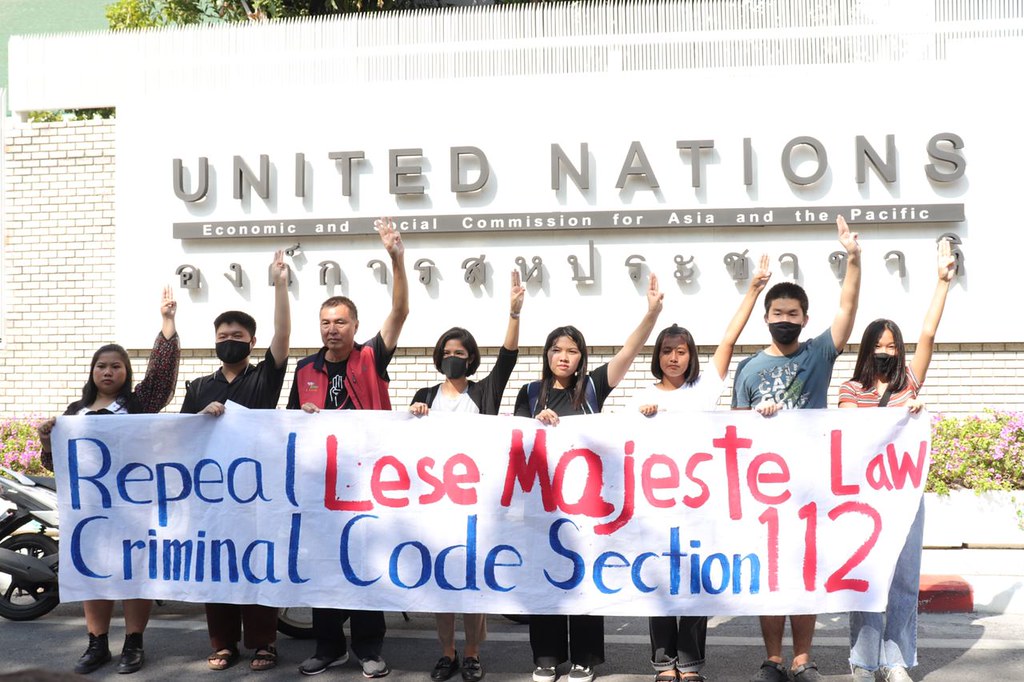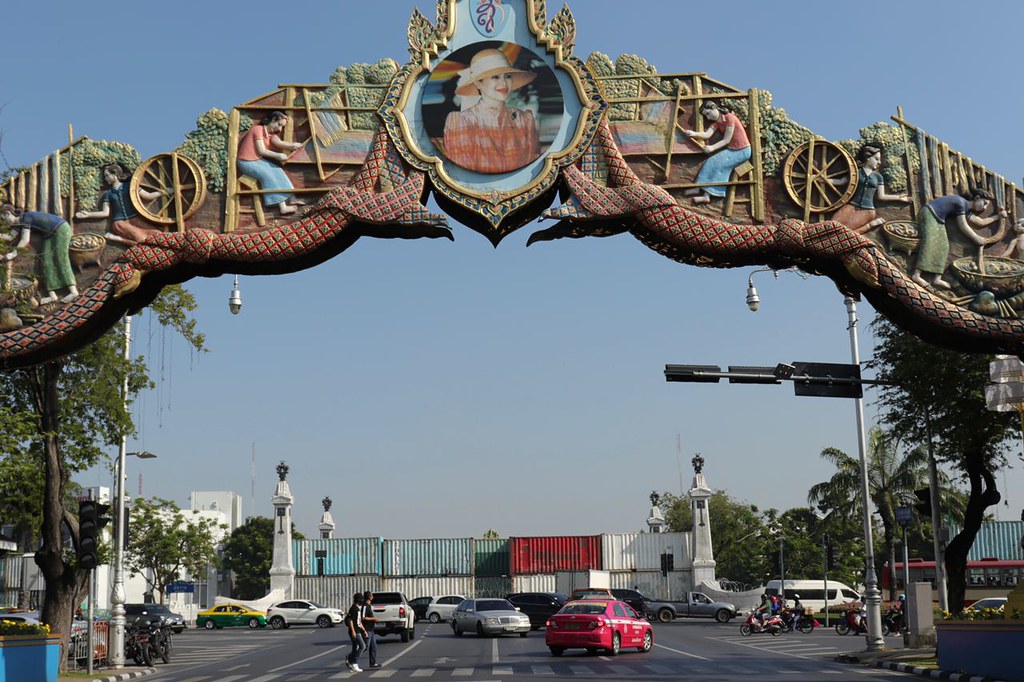Representatives from the 24 June Democracy group went to the United Nations (UN) office in Bangkok today (10 December) to petition the UN Human Rights Council to pressure the Thai government to repeal Section 112, Thailand’s lèse majesté law.

Representatives from the 24 June Democracy group before going to submit their petition
The petition states that the recent pro-democracy protests have been met with state persecution and crackdowns, despite peaceful protest being a right under the Thai constitution and international human rights principles. Many protesters are facing legal charges, with activists now facing charges under Section 112, which has not been used for the past two years.
During the past two weeks, since student activist Parit “Penguin” Chiwarak received a summons for a charge under Section 112 on 24 November, at least 23 people involved with recent protests have been charged with royal defamation.
The petition notes that Section 112 “does not have a clear extent of enforcement,” and that those who have been charged under this law have often been denied bail, which is a restriction of rights and liberties, as well as of freedom of expression in relation to the monarchy.
The petition calls on the UN Human Rights Council to pressure the Thai government to cease persecution against people participating in the pro-democracy protests and to repeal Section 112.
Sinphat Khaiyanan, one of the representatives, said that the group’s aim was to call for the UN or the UNHRC to pressure the Thai government about the legal charges filed against protest leaders, students and members of the public, and to repeal Section 112, which goes against human rights principles, as criticism of various political institutions should be permitted according to the principles of rights and freedoms.
Somyot Pruksakasemsuk, another representative, said that Section 112 is an outdated law which restricts people’s rights and freedom of expression, which is one of the fundamental freedoms, and has been used against the political opposition. He said that since the head of state receives income from taxpayers and is in this position according to the constitution, criticism of the head of state should be permitted in order to resolve the public’s questions about the monarchy. If Section 112 is repealed, the head of state will be able to come to an understanding with the people, which would be beneficial to the monarchy itself and to Thai politics.
Somyot said that the group would be following the process after the petition is submitted, and that there will be rallies both locally and internationally. He said that the group will send letters to international civil society organizations, such as to human rights and labour rights organizations, to call for a show of solidarity, and that the group is in the process of organizing a rally in Switzerland during a UN meeting in May 2021.
Somyot said that he is not concerned about attacks on the monarchy if Section 112 is repealed, as there is already a defamation law, which can be used in case of slander. He said that repealing Section 112 would instead lessen concerns, as the Bureau of the Royal Household would then be able to explain and correct false information.
He said that using Section 112 against protesters will lead to confrontation between the monarchy and the people. He asked whether the judicial process, where the courts represent the monarch as judgements are made in his name, will be just, because if people are denied bail or if an arrest warrant is immediately issued, it will be a reflection of injustice, which would not be beneficial to the government and the monarchy.

Jirasupho giving a speech
While representatives of the group went in to submit their petition, a small stage was set up in front on the UN building with protesters taking turn giving speeches.
A monk named Jirasupho gave a speech saying that Section 112 is similar to Section 116 in that, if whatever is said goes against the values of the institutions concerned, whether it is true or not, the action will be deemed illegal, but Section 112 is worse for many reasons, such as the broad interpretation of the law, or how to interpret the terms ‘threaten’ or ‘insult.’ He asks whether speaking about legal cases involving the monarchy without intending for it to be a threat would be wrong, such as Anon Nampa’s raising questions about the death of King Anada Mahidol, or speaking about the incidents on 14 October 1973 or 6 October 1976. He also asks whether Panusaya Sithijirawattanakul’s address to King Vajiralongkorn (at the rally on 19 September) can be interpreted as a threat.
He said that in other countries, cases like the Holocaust have been investigated until the world understands how bad it is and until people understand the Nazi swastika, but in Thailand, we don’t even know who ordered people to be murdered because these laws keep people silent.
Jirasupho said that he wanted to speak out because one of his university lowerclassmen, Ravisara Eksgool, received a summons for reading a statement during the rally in front of the German Embassy. Many people have told him that he is a monk and therefore should not come out to show support for her, but he thinks that if religion is a representation of good, if religion wants to teach people kindness, it should be possible to support one’s friend. He believes that religion should be against unjust laws. Jirasupho said that he is doing this for his friend and for society, and that if he doesn’t do it today, when would be the time. He said that time is up for a law which is in favour of only one group of people, and he would like people to talk about Ravisara in addition to the protest leaders who have been charged with royal defamation.
Following his speech, while he was in the middle of a media interview, two plainclothes police officers came up to Jirasupho and asked for the name of his temple and other personal information. Jirasupho said that people around him then told him that this is intimidation, and many supported him. He said that, personally, he said nothing wrong. He was only speaking according to the information he has and that he is only criticising the law.
Jirasupho said that he is worried, but he will continue to speak out, but while he is still ordained, he would only be joining activities during the next few days, as the issue of Section 112 is urgent and a violation of people’s rights and freedom, and even his friend has been charged with it.

One of the men who came to ask for Jirasupho's information
During the rally, plainclothes officers also tried to ask for information about Jirasupho from one of Prachatai’s reporters at the scene, but the reporter refused to give them any information.
At 12.20, after the group representatives returned from submitting their petition, the crowd marched to the 14 October 1973 Memorial on Ratchadamnoen Road, where another event, organised by the United Front of Thammasat and Demonstration and the organisers of the Mob Fest rally, was being held.

The march passing through the Democracy Monument
Pleng Tupmalai, representative of the 24 June Democracy group, said that Badar Farrukh, the Thailand team leader of the Office of the High Commissioner for Human Rights (OHCHR), came to receive their petition, and that they spoke about legislation which violates human rights and the safety of people who joined the rally in front of the UN building.
Pleng said that Farrukh insisted that OHCHR representatives have spoken to the Thai authorities about allowing freedom of speech, but the government has not reacted.
Pleng would like the public to help spread awareness about Section 112 and the violence that happened, and asked people not to be afraid, as the fact that the authorities tried to block the rally shows that it is the authorities who are afraid.

Containers blocking Makawan Rangsan Bridge
Prior to the rally, which began at 10.00, the authorities blocked the Makkhawan Rangsan Bridge with a row of containers, which has reportedly been there since the night before. There were also around 200 – 300 riot police stationed behind the containers.
The Thewet Naruemit bridge was also blocked with containers and razor wire. Members of the We Volunteer protest guard group came to move the razor wire, after they received a complaint from people traveling through the area that the wire was blocking the way. A minor clash then occurred after police officers came to order them to leave the area and reportedly threatened to charge them.

Police officers in full riot gear at the Thewet Intersection
We Volunteer staff also went to the Thewet intersection later in the afternoon to move the razor wire blocking the street, claiming they received a complaint from people travelling through the area.
They were trying to negotiate with the police to have a bridge opened over the Phadung Krung Kasem canal, which connects to Bangkok’s old town area, after it was blocked with containers and razor wire. However, a group of police officers in full riot gear surrounded them, which group leader Piyarat Chongtep said could be an attempt to arrest them.
Piyarat and a group of We Volunteer staff had been arrested on Monday night (7 December) after they went to clear the razor wire left behind by the police at the Uruphong intersection, but they were later released.
At around 15.00, We Volunteer retreated from the Thewet intersection, while police officers placed more razor wire on the bridge.
Prachatai English is an independent, non-profit news outlet committed to covering underreported issues in Thailand, especially about democratization and human rights, despite pressure from the authorities. Your support will ensure that we stay a professional media source and be able to meet the challenges and deliver in-depth reporting.
• Simple steps to support Prachatai English
1. Bank transfer to account “โครงการหนังสือพิมพ์อินเทอร์เน็ต ประชาไท” or “Prachatai Online Newspaper” 091-0-21689-4, Krungthai Bank
2. Or, Transfer money via Paypal, to e-mail address: [email protected], please leave a comment on the transaction as “For Prachatai English”
